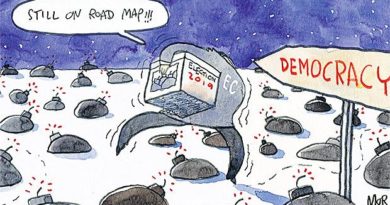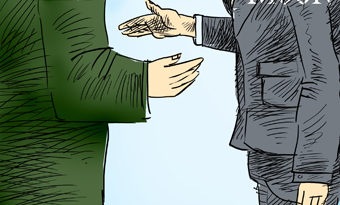OP-ED COLUMNISTS: OPINION ON PAGE ONE BY FRANCISCO TATAD – ‘Emperor in China, vassal in Manila?’
IT wasn’t nearly half as dramatic as the fall of the Berlin wall. But its ultimate effects could come reasonably close, although in the opposite direction. I am referring to the reported decision of the Communist Party of China, at the third plenum of its 19th Central Committee in Beijing, to abandon “collective leadership” and abolish the President’s 10-year “term limit” so that Xi Jinping, now 64, could rule as long as, if not longer than, Mao Zedong or Deng Xiaoping.
Xi’s first term of five years has yet another month to run, after which he will have another five years. Lifting the term limit then could be done much later, but the CPC decided it must be done now. I am no China expert and dare not speculate why.
In 1989, the Berlin wall crumbled to dismantle Soviet communism, bury the Cold War, reunify Germany, and usher in democratic change. This gave birth to a unipolar world under the United States, with its uncontested economic, military and technological might, and its preeminent influence within global institutions.
But globalization and America’s liberal trade and economic policies made China the manufacturing center of the world overnight, and a global economic power.
More for Xi Jinping
The CPC’s decision will now find its way into China’s constitution. It will not write off any conflict involving Beijing and any of its next-door or faraway neighbors, nor bring any pro-democracy celebrators to Tiananmen Square. But it will put China under the tight personal leadership of Xi, perhaps more tightly than it was ever held by either Mao or Deng, who each stayed in power for 30 years.
This could give birth to an extra-large movement against democracy and towards authoritarianism. All the credentialed China scholars and analysts in the West are now clutching at straws trying to find a name that best describes Xi’s emerging one-man rule. There should be no confusion: it’s going to be authoritarian, although probably not so pure and not so simple. “Accountability without democracy,” says a Chinese MIT professor; but accountability to whom is not clear.
Xi will vigorously pursue his One Belt, One Road initiative across Asia, Europe and Africa, promote the Asian Infrastructure Investment Bank and related institutions, scale up the militarization of the disputed reefs and shoals in the Spratlys under his own “Monroe Doctrine,” and try to subordinate the strictures of the UN Convention on the Law of the Sea to the “nine-dash line.”
More authoritarianism
How much human rights will the 1.3 billion Chinese be allowed to enjoy? This could be put to the test in Tibet, Hong Kong and Macau. How humane will be the new rule? A “humane authoritarianism” is an oxymoron; by definition, authoritarianism is usually severe. But this does not prevent people from hoping for a miracle.
Xi’s rule willl be guided by “Marxism-Leninism, Mao Zedong Thought, Deng Xiaoping Theory, the Theory of Three Represents, the Scientific Outlook of Development, and Xi Jinping Thought on Socialism with Chinese Characteristics for a New Era,” as stated in the communique of the third plenum in Beijing. Xi is committed to using China’s wealth and industrial knowhow to claim its “rightful place as a global power,” and to “create a new kind of globalization that will dispense with the rules of ageing Western-dominated institutions.”
To meet the demands of the times, his power as president, as general secretary of the CPC and as chairman of the Central Military Commission may not be enough. He may have to assume absolute powers and become the new Chinese Emperor of the post-Western or post-Christian world. Then China could exercise whatever role it wants for itself.
Not mere equivalence
In his best-selling book “Pacific” (2015), British author Simon Winchester suggests that China is not dying to replace the United States as the dominant Pacific power; all it wants, in his view, is “equivalence” —sufficient recognition of, and respect for its rights as the native regional power. This doesn’t seem to correspond to the CPC decision.
What seems to have anticipated the CPC vision is an earlier international bestseller—Martin Jacques’ “When China Rules the World” (Penguin, 2009). This speaks of China at the crest of a new global order after the “end of the Western World.”
“When I use the phrase ‘China rules the world’,” the author writes, “I do not, of course, mean this literally: no nation has or ever will ‘rule the world’. Rather it is a metaphor for a scenario in which China becomes the world’s leading power, enjoying global hegemony in the manner of the United States, and before that Britain …(This seems to be a growing belief.) A majority of Indians, for example, believe that China will replace the United States as the dominant power within the next twenty years.”
What Chinese youth think
But almost as many Americans and Russians think the contrary, he records, and more than 40 percent of Chinese youth surveyed by Pew think it will take 50 to 100 years for “China’s comprehensive national power to catch up with Western developed nations.” Fifty percent hope that China would be able to become a world military power, but more than 80 percent believe China’s military is “not yet powerful enough and needs to be strengthened.”
More than 45 percent think China should assume a “leadership role as a great military power, after 20 years”; but for now, more than 35 percent think China should act as a “representative of developing countries.”
Could Xi’s one-man rule be the means by which the book’s prophesy might be fulfilled? The book points out that since the Soviet Union collapsed in 1991, and the United States became the undisputed superpower, “we are now witnessing a historic change which, though still in its relative infancy, is destined to transform the world.”
Some highlights:
The developed world is “rapidly being overhauled in terms of economic size by the developing world,” says the book. In 2001 the developed countries accounted for just over half the world’s GDP, compared with around 60 percent in 1973, and by 2025 that figure is likely to be just above one third…But whereas the developed world was responsible for 65 percent of global manufacturing in 1970, compared with 35 percent in the developing world, by 2010 the share of developed countries had fallen to 53 percent, while that of the developing countries had risen to 47 percent.
In 1999 developing countries’ share of total foreign currency reserves was 38 percent, while that of developed countries stood at 62 percent. But by 2010 the position had been reversed with the developing world holding 66 percent and the developed world only 34 percent.
The sovereign wealth funds of Qatar, Abu Dhabi, Singapore, Kuwait and South Korea pumped billions of dollars into US banks between 2007 and mid-2008. The meltdown of some of Wall Street’s largest financial institutions in September 2008 underlined the shift in economic power from the West, with some of the fallen giants seeking further support from sovereign wealth funds and the US government stepping in to save the mortgage titans Freddie Mac and Fannie Mae… Many economies operated up to 10 percent below past trends, but China continued to grow very strongly, with healthy balance sheets.
In 2007, Goldman Sachs predicted that the Chinese economy will be almost the same size as the US economy by 2025, with the Indian economy ranking fourth largest after Japan. By 2050, China will become the largest economy, twice that of the US, with India a close third, almost on a par with the US, followed by Brazil, Mexico, Russia and Indonesia. The UK and Germany will rank ninth and tenth respectively. Brazil could be larger than the economies of Japan, Russia, Mexico and Indonesia, each of which could be bigger than Germany, France and the United Kingdom.
Out of control
No one needs to fear an economically powerful China, which is willing to share its prosperity with others; in fact, every other country may want to benefit from the best possible relations with it. But what will our relations with China be like under an “Emperor” Xi, who is not subject to any restraining voice at home, or to any legal rescript abroad, if he continues to militarize the reefs and shoals and other maritime features within our exclusive economic zone (EEZ) without so much as a whimper from our government?
How will the mandarins in Beijing respect our rights, if our President continues to tell our people not to mind our loss of national sovereignty, territorial integrity, national honor and national self-respect just because we are getting loans, investments, and infrastructure projects from the Chinese? Aren’t we getting so much more from the Japanese, virtually at zero interest rate, without having to barter any sovereign right?
This is what concerns me most. The President committed an impeachable offense when he failed to defend our maritime rights against China’s aggressive acts, even after the Permanent Court of Arbitration at the Hague had ruled that China has violated our sovereign rights over certain maritime features within our EEZ in the Spratlys. Now he insults our collective intelligence by telling us that we co-own the South China Sea with China—without qualifying this statement as one of his tasteless jokes and fake news.
400,000 “spies”?
In a recent column, I wrote about China’s potentially dangerous control of some of our most sensitive strategic resources. It now reportedly owns 40 to 60 percent of the National Grid Corp., which controls the supply and distribution of electric power; and through Huawei, the Chinese-owned information and communications technology solutions provider, it reportedly plans to create a “facial recognition surveillance system” on the whole population. This could be misused even in the hands of the national government; the danger would be incalculable if it fell into the hands of an alien government.
This information has provoked fear that the government might be opening itself to hostile attack from outside. Serious individuals have expressed concern over the massive Chinese arrivals supposedly connected to Chinese government projects. These arrivals seem to look like the Japanese “spies” who came as gardeners and handymen before the war—and turned out to be high officers of the Japanese imperial army as soon as the war began.
I was disturbed by these reports and wrote about them. But a couple of days ago, someone with a credible intelligence background chided me for not providing a more accurate picture of this alien presence. According to him, he had been monitoring closely this “unexplained Chinese diaspora in the Philippines,” and at least 400,000 Chinese individuals are now in the country engaged in various activities.
Some 100,000 are reportedly in Makati, engaged in electronic-gaming; another 100,000 are in northern Luzon, engaged in tourism; 125,000 are spread all over, engaged in mining and construction; 50,000 are in Zambales, apparently studying Clark and Subic; and 25,000 are in Palawan, buying real estate. The informant believes 70,000 or so of this number could be members of the People’s Liberation Army, who have no right to be in the Philippines.
I cannot vouch for the accuracy of this information. But the information is real, and the concern generated among those who share it is quite high. I am asking the President, the Secretary of National Defense and the chiefs of our intelligence services to check on it now, while there’s still time. I know I risk being laughed at for “crying wolf,” but this involves the highest national security, and it is a risk worth taking
[email protected] / The Manila Times / ON
NOTE : All photographs, news, editorials, opinions, information, data, others have been taken from the Internet ..aseanews.net | [email protected] | For comments, Email to : D’Equalizer | [email protected] | Contributor.











